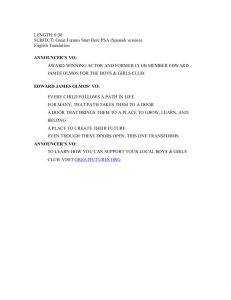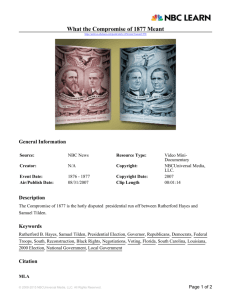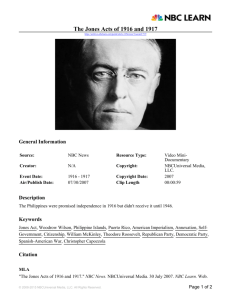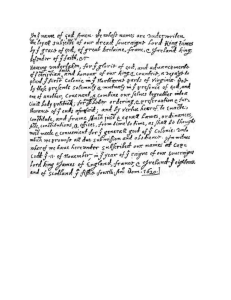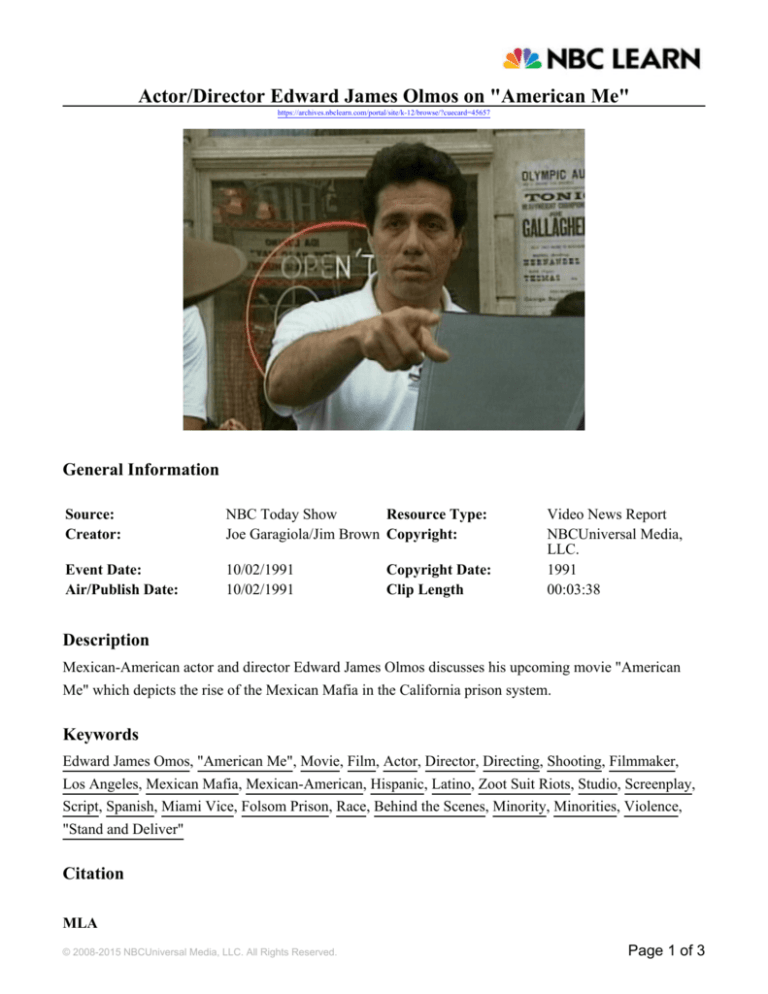
Actor/Director Edward James Olmos on "American Me"
https://archives.nbclearn.com/portal/site/k-12/browse/?cuecard=45657
General Information
Source:
Creator:
NBC Today Show
Resource Type:
Joe Garagiola/Jim Brown Copyright:
Event Date:
Air/Publish Date:
10/02/1991
10/02/1991
Copyright Date:
Clip Length
Video News Report
NBCUniversal Media,
LLC.
1991
00:03:38
Description
Mexican-American actor and director Edward James Olmos discusses his upcoming movie "American
Me" which depicts the rise of the Mexican Mafia in the California prison system.
Keywords
Edward James Omos, "American Me", Movie, Film, Actor, Director, Directing, Shooting, Filmmaker,
Los Angeles, Mexican Mafia, Mexican-American, Hispanic, Latino, Zoot Suit Riots, Studio, Screenplay,
Script, Spanish, Miami Vice, Folsom Prison, Race, Behind the Scenes, Minority, Minorities, Violence,
"Stand and Deliver"
Citation
MLA
© 2008-2015 NBCUniversal Media, LLC. All Rights Reserved.
Page 1 of 3
"Actor/Director Edward James Olmos on "American Me"." Jim Brown, correspondent. NBC Today Show.
NBCUniversal Media. 2 Oct. 1991. NBC Learn. Web. 18 March 2015
APA
Brown, J. (Reporter), & Garagiola, J. (Anchor). 1991, October 2. Actor/Director Edward James Olmos on
"American Me". [Television series episode]. NBC Today Show. Retrieved from
https://archives.nbclearn.com/portal/site/k-12/browse/?cuecard=45657
CHICAGO MANUAL OF STYLE
"Actor/Director Edward James Olmos on "American Me"" NBC Today Show, New York, NY: NBC
Universal, 10/02/1991. Accessed Wed Mar 18 2015 from NBC Learn:
https://archives.nbclearn.com/portal/site/k-12/browse/?cuecard=45657
Transcript
Actor/Director Edward James Olmos on "American Me"
Joe Garagiola, co-host:
Edward James Olmos is best known for his work on TV's "Miami Vice" and the movie "Stand and
Deliver," but his new movie project may be a better indicator of what he can do. And our man in
Hollywood, Jim Brown, reports that Olmos is a lot more than just the star of this one.
Edward James Olmos: Everybody stand there until I give you the signal. And then don't look at the
camera; just start across the street talking. Action!
Unidentified Man #1 (Off Camera): Rolling!
Unidentified Man #2 (Off Camera): Play back.
Jim Brown reporting:
Moviemakers have often taken over real-life city streets and turned back the clock to recreate an earlier
time, but director and star Edward James Olmos did it the old-fashioned way for his new movie,
"American Me." He did it on the studio back lot. This is a story of the rise of a hero in the LA ghettos who
becomes head of the Mexican Mafia. The origins are in the 1943 so-called Zoot Suit Riots in downtown
Los Angeles.
Olmos: We would have never have gotten the production value that we get here on the back lot. Here on
the back lot, like I told you, we're using six streets. On the streets of Los Angeles, we were lucky if we
could have used one corner.
Brown: Olmos, who is co-writer, co-producer, star and making his directing debut, is concerned here with
decisions big and small.
Olmos: Let me see your hair.
Brown: When stuntmen informed Olmos they wanted $3,000 each to portray the Latinos who get their
long hair cut by rioting servicemen, Olmos helped his $16 million budget by turning to his extras. (Olmos
speaks Spanish.)
© 2008-2015 NBCUniversal Media, LLC. All Rights Reserved.
Page 2 of 3
Olmos: You guys all get a hair cut. All right?
Brown: Sitting in the living room of his home, a structure described as `the house that "Miami Vice"
built,' Edward Olmos made sure I understood that "American Me" is a very contemporary story about
Latino gang life and the California prison system.
Olmos: I am depicting the events through the eyes of the Mexican-American, but I think it's going to be
pretty well pronounced so that people understand that it could have been white it could have been black, it
could have been yellow, it could have been red. I chose it to be brown because that's what I know best.
You guys will slowly start to stop saying anything.
Brown: Olmos' hardest sell was to film in California's Folsom Prison. It was `yes,' and then it was `no.'
But following an impassioned, 40-minute appeal by Olmos about the need to understand why so many
minorities are in prison, it was again `yes.'
Olmos: When we went to Folsom, we asked them to literally change their--their daily routine.
Brown: They didn't want to do that at first?
Olmos: No, they never--they would never do that. They would--I don't think they'll ever do it again. The
intent of this film is pure in understanding that if one person sees this and understands the environment a
little bit better, that stops them from trying to get into this environment or maybe slipping into this
environment, then we will have won.
We cannot say--make one sound, but at the same time, we've got to look and understand that this is a
reality, and this place is chaos, total, total chaos. In the world that we're dealing with, the violence is—is
common and everyday, and that has to be depicted. And--and our story actually evolves around what has
happened to these people. I think that this is still on the realm of--of using our craft, you know, to
understand ourselves a little bit better--just like I did in "Stand and Deliver" or in "Triumph of the Spirit"
or "Ballad of Gregorio Cortez" or even "Zoot Suit."
Brown: "American Me" had its origins in Floyd Mutrux's 1973 movie called "Aloha, Bobby and Rose,"
which gave a break to a young actor whose credit read `Chicano Number One, played by Eddie Olmos.'
Well, in the ironies of Hollywood, Mutrux's "American Me" script is also competing before the cameras
with a similar Mutrux view of violence in Latino life called, "Blood In, Blood Out," being directed by
Taylor Hackford. So like the gangs on the streets they portray, "American Me" and "Blood In, Blood Out"
will soon be fighting for their respective box office turf.
Olmos: That's the best shot over there.
Brown: But "Blood In, Blood Out" has no release date as yet, while "American Me" is due out early next
year. For "Today", Jim Brown, NBC News, Hollywood.
© 2008-2015 NBCUniversal Media, LLC. All Rights Reserved.
Page 3 of 3

